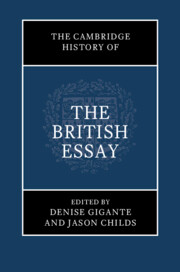Book contents
- The Cambridge History of the British Essay
- The Cambridge History of the British Essay
- Copyright page
- Contents
- Illustrations
- Contributors
- Acknowledgements
- Preface to a History in the Manner of an Essay
- Part I Forming the British Essay
- 1 Ancient Influences on the Essay
- 2 Surprised into Form: The Beginnings of the English Essay
- 3 Miscellanies, Commonplace Books, and the Essay
- 4 Incoherence Brought to Order: Empiricism and the Essay
- 5 The Sermon and the Essay
- 6 Anger, Rhetoric, and Early Women Essayists
- 7 The Polemical Essay in Pamphlets, Newsbooks, and Periodicals
- 8 Between Public and Private: Letters, Diaries, Essays
- 9 The Art of Criticism: Essay as Citation
- Part II The Great Age of the British Essay
- Part III Assaying Culture, Education, Reform
- Part IV Fractured Selves, Fragmented Worlds
- Part V The Essay and the Essayistic Today
- Book part
- Bibliography
- Index
6 - Anger, Rhetoric, and Early Women Essayists
from Part I - Forming the British Essay
Published online by Cambridge University Press: 31 October 2024
- The Cambridge History of the British Essay
- The Cambridge History of the British Essay
- Copyright page
- Contents
- Illustrations
- Contributors
- Acknowledgements
- Preface to a History in the Manner of an Essay
- Part I Forming the British Essay
- 1 Ancient Influences on the Essay
- 2 Surprised into Form: The Beginnings of the English Essay
- 3 Miscellanies, Commonplace Books, and the Essay
- 4 Incoherence Brought to Order: Empiricism and the Essay
- 5 The Sermon and the Essay
- 6 Anger, Rhetoric, and Early Women Essayists
- 7 The Polemical Essay in Pamphlets, Newsbooks, and Periodicals
- 8 Between Public and Private: Letters, Diaries, Essays
- 9 The Art of Criticism: Essay as Citation
- Part II The Great Age of the British Essay
- Part III Assaying Culture, Education, Reform
- Part IV Fractured Selves, Fragmented Worlds
- Part V The Essay and the Essayistic Today
- Book part
- Bibliography
- Index
Summary
This chapter proposes that early modern women essayists invoked anger to negotiate new modes of publicity in the nascent public sphere. By reading the writings of Jane Anger, Rachel Speght, and Margaret Cavendish alongside the history of humanist education, it shows that anger’s original object was not misogyny writ large, but the rhetorical training that limited women’s access to privileged protocols of speaking and writing. By the end of the early modern period, it argues, anger dissipates as the rise of salon conversation and letter writing expand the field in which literacy can be displayed, weakening rhetoric’s grip on the republic of letters.
Keywords
- Type
- Chapter
- Information
- The Cambridge History of the British Essay , pp. 77 - 91Publisher: Cambridge University PressPrint publication year: 2024

